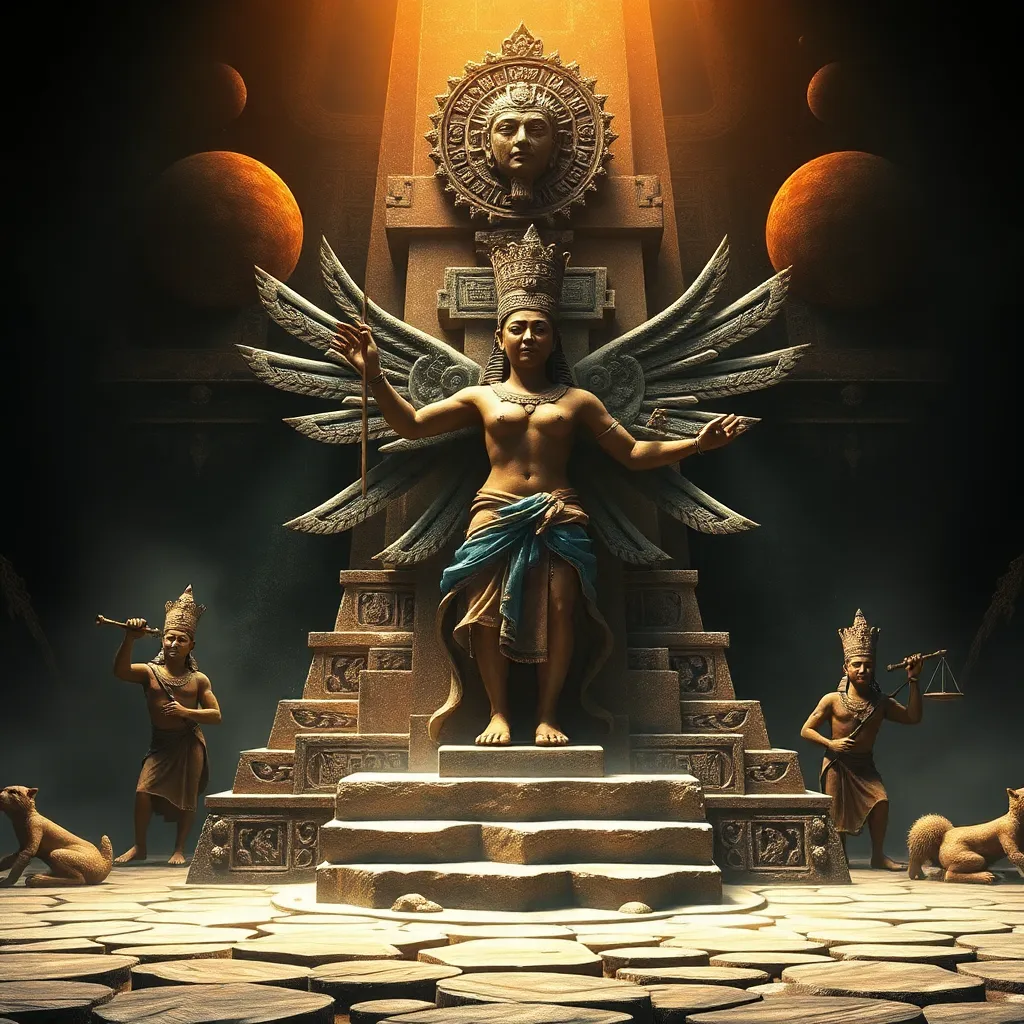Itzamná and the Mayan Concept of Justice: A Divine Law
I. Introduction
Itzamná is a central figure in Mayan mythology, revered as a creator god and a deity of wisdom. His significance extends beyond mere mythology; he embodies the principles of justice and morality that governed Mayan society. The Mayans held a complex view of justice that intertwined with their religious beliefs, social structures, and concept of divine law. This article explores Itzamná’s role in the Mayan understanding of justice, the societal implications of this divine law, and its enduring relevance.
II. The Role of Itzamná in Mayan Cosmology
Itzamná’s position in Mayan cosmology is multifaceted. As a creator god, he is credited with the formation of the world and the establishment of order in the universe. His wisdom is reflected in the laws that govern both the cosmos and human society.
A. Itzamná as a Creator God and Deity of Wisdom
Itzamná is often depicted as a benevolent figure who brought knowledge and culture to the Mayans. He is associated with various aspects of life, including agriculture, healing, and writing. His wisdom is seen as a guiding force for the Mayan people.
B. Connections between Itzamná and Justice
Justice in Mayan belief is not merely a human construct but is deeply rooted in the divine order established by Itzamná. He is viewed as a protector of the weak and a judge who ensures that moral order is maintained.
C. Itzamná’s Influence on the Mayan Understanding of Divine Law
Divine law in the Mayan context is seen as an extension of Itzamná’s will. The principles of justice, truth, and reciprocity are interwoven with the fabric of their cosmological beliefs. The Mayans believed that adherence to these laws would result in harmony within society and the cosmos.
III. The Concept of Justice in Ancient Maya Society
The Mayan civilization was characterized by a hierarchical social structure with a complex governance system. Justice, as understood by the Mayans, was both a social and spiritual matter.
A. Overview of Mayan Social Structure and Governance
- Society was divided into classes: nobles, priests, commoners, and slaves.
- Leadership was often linked to divine legitimacy, with rulers seen as representatives of the gods.
- Legal disputes were handled in courts presided over by priests and nobles.
B. Differences between Human and Divine Justice
Human justice was often concerned with social order, while divine justice, as represented by Itzamná, encompassed moral and ethical dimensions. It was believed that failing to adhere to divine law could result in calamities, reflecting the interconnectedness of human actions and cosmic order.
C. The Moral and Ethical Foundations of Mayan Law
Mayan law was founded on a set of ethical principles that emphasized community welfare, respect for elders, and the importance of reciprocity. These principles were believed to be divinely inspired and were crucial in maintaining social harmony.
IV. Divine Justice as Reflected in Mayan Texts
The sacred texts of the Maya, particularly the Popol Vuh, provide insights into their understanding of divine justice and Itzamná’s role within it.
A. Examination of the Popol Vuh and Other Sacred Texts
The Popol Vuh narrates the creation myths and the adventures of the Hero Twins, showcasing how Itzamná intervened in human affairs to restore balance and justice. It serves as a testament to the moral and ethical teachings of the Mayan worldview.
B. Examples of Itzamná’s Judgments and Interventions
- In the Popol Vuh, Itzamná punishes those who act unjustly, emphasizing the consequences of moral failure.
- His guidance is sought in times of crisis, demonstrating the belief in divine intervention in human affairs.
C. The Role of Prophecy and Divine Signs in Justice
Mayan society was attuned to signs and prophecies that were believed to be messages from Itzamná. These signs often guided decisions regarding justice and governance, reinforcing the notion that divine law was ever present in everyday life.
V. Rituals and Practices Associated with Justice
The Mayans engaged in various rituals to invoke Itzamná’s guidance and ensure the administration of justice.
A. Ceremonial Practices to Invoke Itzamná’s Guidance
Rituals often included offerings, prayers, and ceremonies aimed at pleasing Itzamná. These practices were believed to secure his favor and ensure justice was served in accordance with divine law.
B. The Role of Priests in Administering Justice
Priests acted as intermediaries between the divine and the human realm. They were responsible for interpreting divine will and administering justice based on moral and ethical guidelines.
C. Community Involvement in Maintaining Social Order
The Mayan community played an active role in upholding justice. Public assemblies and discussions were common, where community members could voice concerns and participate in the judicial process.
VI. Case Studies of Justice in Mayan History
Throughout Mayan history, there are notable events reflecting Itzamná’s influence on justice and governance.
A. Notable Historical Events Reflecting Itzamná’s Influence
Many historical accounts detail instances where rulers invoked Itzamná’s name to justify decisions or seek his favor during conflicts, illustrating the intertwining of divine justice with political affairs.
B. The Outcomes of Legal Disputes in Mayan Courts
Legal disputes often resulted in outcomes that reflected both social norms and divine law. Decisions made in courts were seen as extensions of Itzamná’s will, reinforcing the moral fabric of society.
C. The Interplay of Politics and Divine Justice
Political leaders utilized the concept of divine justice to legitimize their authority, often portraying themselves as chosen by Itzamná to maintain order and execute justice.
VII. The Legacy of Itzamná and Mayan Justice Today
The legacy of Itzamná continues to resonate within contemporary Mayan communities, where traditional beliefs and practices persist.
A. The Impact on Contemporary Mayan Communities
Many modern Mayans still look to Itzamná for guidance in moral and ethical matters, reflecting a continuity of belief that transcends time.
B. Comparisons with Modern Concepts of Justice
While modern justice systems may differ significantly, the core principles of fairness, accountability, and moral order echo the ancient beliefs associated with Itzamná.
C. Preservation of Traditional Beliefs and Practices
Efforts to preserve traditional Mayan beliefs include rituals, storytelling, and community gatherings that emphasize the importance of justice as a divine principle.
VIII. Conclusion
In summary, Itzamná plays a pivotal role in the Mayan understanding of justice, serving as a divine lawgiver whose influence permeates all aspects of life. The principles he embodies continue to hold relevance, illustrating that justice is not only a societal construct but also a universal principle that transcends cultures and time. The enduring legacy of Itzamná reminds us of the importance of justice in fostering harmony and balance within our communities.




